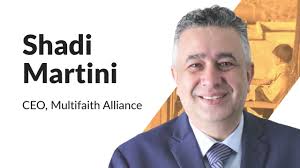Saudi journalist Abdulaziz al-Khamis and Syrian activist Shadi Martini participated in a session at the Israeli Knesset on Wednesday, in a move that appears to promote normalisation with Israel amidst ongoing atrocities in Gaza and continued Israeli incursions into Lebanese and Syrian territories.
Their visit coincided with that of a delegation of Arab imams and sheikhs from Europe, who met with Israeli President Isaac Herzog. These visits, orchestrated as part of wider efforts by Israeli, Arab, and international actors, aim to build support for a regional normalisation initiative despite the continued Israeli war on Gaza and occupation of Palestinian, Syrian, and Lebanese lands.
A source present at the Knesset session told Al-Araby Al-Jadeed that the meeting was organised by the Lobby for Advancing a Regional Security Arrangement, a coalition seeking to promote an Arab–Israeli regional settlement. Al-Khamis, who resides between Abu Dhabi and London, confirmed his presence at the Knesset but declined to answer questions about the purpose of his visit.
The source said that Martini and Al-Khamis had been invited by this coalition, which blends official parliamentary engagement with Israeli civil society activism. Martini, a former hospital director from Aleppo, reportedly travelled to Israel directly from Syria and met with Syrian transitional president Ahmad Al-Sharaa two weeks earlier in Damascus. According to the source, Martini conveyed that Al-Sharaa described the current moment as “a once-in-a-century opportunity for the Middle East.”
No officials from other Arab countries attended the session; only representatives of Israeli organisations advocating political solutions were present, along with opposition members of the Knesset—not the governing coalition. Separately, the visiting European imams met with President Herzog and toured the Yad Vashem Holocaust memorial earlier this week.
Israeli lawmaker Gilad Kariv posted a photo from the Knesset session on X (formerly Twitter), writing:
“At the same table – a Saudi analyst (Abdulaziz Al-Khamis), a Syrian political figure (Shadi Martini), Knesset members from various parties, representatives from the regional security coalition and Darcheinu movement, and civil society organisations. What the government won’t do, we will. We must not miss the political opportunity that follows this war – in our region, and between the river and the sea.”
According to the Israeli news site Walla, Al-Khamis spoke at the session, which was framed around the prospects for regional cooperation following Israel’s recent attack on Iran and during the ongoing war in Gaza. He stated:
“Let’s be clear. From Riyadh to Abu Dhabi, the question is not who won the war, but what comes next. There is fatigue in the Gulf from conflict and emergency. There is hunger for stability and partnership. The question is whether Israel can shift from a posture of power to an era of partnership, translating its military deterrence – which is undeniable – into political success.”
Al-Khamis added, according to Walla, that for Saudi Arabia, the Palestinian issue and ending the war in Gaza are essential:
“We cannot accept a situation where people are imprisoned in Gaza. Saudi Arabia’s vision is not local, it’s regional. There must be a decentralized Palestinian state, and Israel must commit not only to security, but to coexistence. These are not lofty demands – they are the minimum humanitarian conditions. If Israel uses this moment to deepen the occupation and humiliate Gaza, it won’t only lose Saudi Arabia, but the entire Arab world.”
Kariv continued:
“Prime Minister Netanyahu boasts about reshaping the Middle East over the past year. But the real question is: What will we do with this change? A comprehensive deal to end the war and return all hostages should be the beginning, not the end. We must move toward bold agreements that reshape the region, create alliances between moderates, and offer hope to both our peoples and to the broader Abrahamic family.”
Knesset member Alon Schuster added:
“Thanks to the courage of our soldiers, we are in a position to turn battlefield gains into political transformation. Historic opportunities lie before us, and every political arrangement must be rooted in security, broad consensus, and leadership brave enough to choose a better future.”
The Lobby for Advancing a Regional Security Arrangement was jointly launched by Knesset members Gilad Kariv (Democrats), Ram Ben-Barak (Yesh Atid), and Alon Schuster (National Unity). Ben-Barak claimed at the session’s opening that the approach of Israeli–Saudi normalisation was one of the key factors behind Hamas’s October 7, 2023 attack, and that now is the time to transform Israel’s military victories into diplomatic achievements by expanding the Abraham Accords to include more Arab states.
Shadi Martini has long been associated with Syrian businessman Ghassan Aboud, owner of Orient TV. Martini previously participated in meetings with Israeli officials in Madrid in 2016. On August 2, 2017, The Jerusalem Post published a photo of him in front of Israeli soldiers. He has also been linked to Israel’s “Good Neighbour” program on the Syrian border. In a 2018 Al-Araby Al-Jadeed investigation, he admitted the program was overseen by the Israeli military and confirmed that he facilitated aid deliveries to southern Syria through it. He currently identifies as CEO of the Interfaith Alliance, founded in 2013.
As for Abdulaziz Al-Khamis (born 1961), he is the former editor-in-chief of Al-Majalla, the Saudi-owned magazine published in London, and has written for Asharq Al-Awsat. He currently leads Al-Arab, a London-based newspaper, and previously founded the Saudi Centre for Human Rights Studies in London during the 1990s.
This article was translated and edited by The Syrian Observer. The Syrian Observer has not verified the content of this story. Responsibility for the information and views set out in this article lies entirely with the author.


